Andrew Collins's Blog, page 26
February 4, 2013
I now pronounce you
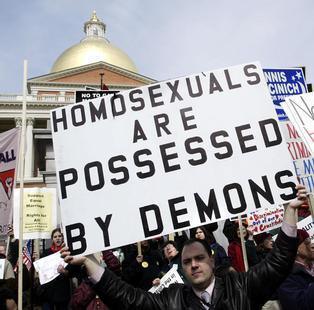
Love and marriage go together like a horse and carriage, according to the old song. It’s true enough, even though you see horses pulling carriages less these days. It doesn’t specify in the lyric that the people getting married have to be a man and a woman, although having been written in the mid-50s by Sammy Cahn, its implication is likely to be that you should be a man and a woman in order to get married, because you did in those days – and still do in all but nine of the United States – but the song’s sentiment has lasted well over the years. So even though Sammy – most famously through the voice of Mr Frank Sinatra – is implicitly promoting legal heterosexual union, it is still one based wholly in love, so would surely apply to a man and a man, or a woman and a woman, and any transgender combination in between.
Love and marriage, love and marriage,
Go together like a horse and carriage.
This I tell ya, brother, you can’t have one without the other.
Love and marriage, love and marriage,
It’s an institute you can’t disparage.
Ask the local gentry and they will say it’s elementary.
Try, try, try to separate them, it’s an illusion.
Try, try, try and you only come to this conclusion:
Love and marriage, love and marriage,
Go together like a horse and carriage.
Dad was told by mother you can’t have one
You can’t have none.
You can’t have one without the other.
I ask you this: how much time have you spent in your life agonising over what you think about gay marriage? For me, since the issue of civil partnerships first arose this century, it was probably a couple of seconds, after which I arrived at the obvious conclusion: why the hell not? There is, to me, literally no reason why not. (Fortunately I am not bound by religious dogma of any kind, so my decision is final and resolute.) But it seems that out there in the world of traditional, right-wing thought, especially religious right-wing thought, some people spend an awful lot of time wrestling with the issue. Actually agonising over it. To the point of sending worried delegations to government and taking to the streets with placards.
Even though my views on the banning of fox-hunting are clear – another issue that took up a lot of Parliamentary time during the first act of the New Labour government but eventually passed – I can easily see why some would vehemently disagree with my point of view. I find it much harder to empathise with those who are against gay marriage.
What harm can it do? I posted a Tweet about it this morning, after seeing another Tory on the news bemoaning David Cameron’s apparently radical plan to promote its legalisation with an opt-out for any church that disagrees with the equalisation of rights for all humans, and wondering why, seriously, it would bother a heterosexual so much that a homosexual person might love someone so much that they wish to make it legal, on equal terms with their heterosexual neighbour? If they hold the institution of marriage so dear, why would they legally discourage people from entering into it, just because they are gay?
Commitment to a partner via the tradition of marriage, whether religious or secular, is no bad thing. But there are no rules. Some couples raising kids out of wedlock appear to be doing a great job; and some who are married are having a rotten time of it and may inadvertently be lighting a fuse to future anxiety in their kids. I’m sure gay parents will screw up, too. We’re all human. And that’s the point. No? Some single parents do a better job than unhappily married parents, too. Why is that hard to understand? It takes all sorts.
Homosexuality has been legal in this country for most of my lifetime and the age of consent equalised with the heterosexual equivalent; why dig your Tory heels in on this particular issue? Marriage would make adoption of children easier for gay couples, but I expect the real burst-bloodvessel Tories would be against that too.
What bothers me the most is that even the retired colonels qualify their homophobia with, “We’re not anti-gay but …”, which is always a giveaway, but in this case might even be true on a very superficial level. (I expect they don’t mind what the gays do “behind closed doors”. How tolerant of them.) So you’re not anti-gay, but you deny gays equal rights? Then you are anti-gay. My Tweet to this effect – common sense, as far as I can see – was re-Tweeted about 360 times during the day, and is still being re-Tweeting as I type. I’m glad that it struck a chord, although I wish I lived in a country where it didn’t need saying out loud.
I had one dissenting voice on Twitter – I much prefer preaching to the choir! – from a person who I’m not going to name, as I found their comment calm, honest, non-combative and, in its own way, rational. I also find it easy to sidestep. They wrote, “Why not create a new institution giving the same legal rights as marriage?” Their problem was in calling it “marriage.” I have heard this caveat before. So they weren’t even against gay marriage per se, they were just against it being called “marriage.”
Can this just be a semantic argument, after all? Is it not the institution of marriage but the word of marriage that matters to those against the gay upgrade?
The Commons vote is tomorrow. They’re saying that Cameron’s enthusiasm for the vote-winning legalisation of gay marriage – and that’s surely all it can be – will sink him, and he will be stopped by the “old guard” of the party he seems nominally to be trying to modernise while he and his baronet pals are actually driving the welfare state into the sea and forcing the poor to beg for their food, thus doing what no Tory party has achieved in our lifetimes.
There, I’ve thought about gay marriage for way longer than the subject needed to be thought about. I hope you’re happy, retired colonels on the news! (You don’t look it)

January 31, 2013
Listening without prejudice

As previously revealed, I took home around 20 pre-release CDs – mostly singles; a couple of albums – from my 6 Music pigeonhole last week. I uploaded them all at the weekend and have been listening intently on my ancient iPod ever since. (I’ve noticed that as iPods get smaller, headphones are getting bigger and bigger; my iPod is massive, and my headphones tiny. I’m no follower of fashion!) Anyway, I counted 19 new songs, most of them coming out in February or March. Few had actual paper press releases attached, and if they had information on a sticky label affixed by their plugger, I deliberately avoided reading it, so as to be able to listen to these artists, mostly unknown to me by name, without prejudice. Sometimes, seeing a picture of a band can influence the way you feel about their song.
Now, it’s inevitable that I won’t like everything, or even the majority, in a mass listening session like this, but let’s take out the artists I’d heard of first: Johnny Marr, The Vaccines, Low and The Wonder Stuff. I continue to be underwhelmed to the point of toothache by the Vaccines, who are doing very nicely without me anyway, so I shan’t lose sleep over our lack of a connection. I am already mad about The Wonder Stuff, in person and on record, and fully approve of their From The Midlands With Love project, whose final addition is Planet Earth and Get Up! Johnny Marr’s single Upstarts is OK, confident, driving, but again, he doesn’t need my support. Minnesota’s Low are minor legends, and their new single Plastic Cup is slow, lilting, melancholy and lovely, and its lyric actually has content (“the cup will probably be here long after we have gone”), which is something to cherish in this grey age. Oh, and ex-Beta Bandsman Steve Mason is also well established, and his new single Fight Them Back is effortlessly brilliant.
Since working with Josie two years ago (is it really? yes it is), I have become reconnected with new music, and new artists. So let us praise those songs by bands and songwriters about whom I know next to nothing. The pic at the top is of Tall Ships in action. As I type, I know I really love their coruscating but joyous single, T=0, but I have yet to look them up. They appear English, but who knows? Theirs is the real find of the batch, along with Wanderlust by Cloud Boat. (Nautical theme entirely coincidental.) Again, I know not who Cloud Boat are, or is. But the song is like a mini-symphony, even the three-minute radio edit; I’m getting James Blake, I’m getting My Bloody Valentine, I’m getting early Cocteau Twins … I’m getting something so delicate it makes a kind of mockery of what “a single” is, or should be. I have just found this image of Cloud Boat. Of course they’re in a church.

Of the rest, I was initially quite taken by the sheer bombast of Pompeii by Bastille, even though it seems to be squarely aimed at the charts with its autotuned vocal and singalong chorus. Far cooler seeming are Io Echo, whose Ministry Of Love has real atmosphere, with female vocals far away in the distance, and more than a hint of Goth in its distorted guitars. Disco Sucks by The Computers has a good title, and is driven by old-fashioned rawk grit. I’m guessing they’re American, and very glad that Jack White came along a few years ago. Further up my street is the driving Ocean by Coasts (heavens: more water!), although, again, it sounds as if it has its eye on the post-Metronomy/xx prize. Also good is On The Spines of Old Cathedrals by Shrag, as it sounds like it was released in the early 90s. Spiky male-female vocals, apologetic drumming, but real energy. Unlike Bastille and Coasts, they don’t sound like they care too much whether or not you dance to it in a club.
I won’t mention the new bands whose tracks I didn’t latch onto. What would be the point of that? Not everything is for everyone. And anyway, I seem to have liked exactly half of the songs I uploaded. That’s pretty cool.
And now, to complete my experiment, I shall look up the bands I like, and provide links to their websites.
Tall Ships are from Falmouth, it appears. (I once lectured at Falmouth University – what a fantastic place.) There is another, American band called The Tall Ships, which is unhelpful, and the phrase “tall ships” mainly takes you to tall ships if you tap it into a search engine, but their MySpace page is here, the video is here, and their product is here.
Cloud Boat have their Facebook page (I really can’t get on with Facebook, but you may be more conversant with its workings), and the video for the full-length version of Wanderlust is here. If I was a band, I’d have a website that just showed a picture of me, and said where I was from. (Follow them on Twitter here.)
Coasts are a mystery. I don’t have the disc in front of me, so can’t even check the sticker. Look them up and find nothing as I did. Maybe I’ve got their name wrong. Still like the song!
Shrag have just announced that they’re calling it a day. Brilliant. This is me really getting in at the ground floor – they’ve only released three albums and about ten singles without me noticing. Still, I like the song, their blog is here, and they even have a Wikipedia entry. I’m going to seek out their last album Canines, from which the single is taken. It looks brilliant: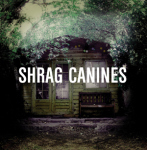
Io Echo are easier to find, as their name is unique. They have a website, and although I can see that they are a duo, and look quite amazing, it doesn’t say where they’re from. They seem to be very new, with a debut album to come. At least they didn’t split up before I “discovered” them. (Their MySpace doesn’t say where they’re from either.)
Bastille seems to be one man. He’s British and his MySpace page is here. Apparently Huw Stephens likes the song, so it might be a hit. I have no interest in the charts or predicting hits.
The Computers turn out to be British, from Exeter in fact, signed to Fierce Panda, and they look like they wish it was the 1970s. Good on them for that, and for looking like a band. They seem to run a club night called Disco Sucks. I don’t think they have a website, but this is them.
The following artists are well-established, but I liked their songs, and will provide links anyway, since I seem to be running an online fanzine all of a sudden. Steve Mason is here. Low are here. And The Wonder Stuff are here.
Sorry to namedrop but I was having a heated conversation with genial Martin Freeman at the Radio Times party on Tuesday night. He’s a massive music fan, as you probably know – indeed, I first met him when we were teamed up on the Radio 4 music quiz All The Way From Memphis, and had him on Roundtable a number of times – and only a few years younger than me, so we’ve both experienced that awful realisation that modern music doesn’t quite do it for you in the same way that modern music did in the past. Martin wanted to know if it was an age thing, something we all inevitably go through, or whether his feelings about modern music have something to do with the poor state of modern music. I think it’s a bit of both, but more of the former.
True, the singles charts are unrecognisable to me now, with everybody “featuring” on everybody else’s record and slick R&B and autotuned identipop dominant, but without Top of the Pops, I’m disconnected from them anyway. (If it was on, I guarantee I’d watch it every week, and know more.) I’m not in any way disinterested in new music, as I hope this experiment has proved, but even though it’s easier than ever to access music, for free, I find I need a curator, a filter, a third party to keep me up to date. And I have a pigeonhole! (I think Spotify is a smashing thing, but it’s too big. Where to start?)
What do others think? In the meantime, I say hooray for Tall Ships, and Cloud Boat, and Shrag, and Steve Mason, and Low, and The Computers, and a band I’ve not yet heard of who are going to blow me away. (I also got the Palma Violets debut album, which I’m still investigating, but I liked them on Later as they seemed to be young men who’d heard the first Clash album)


January 29, 2013
Following the following
 After publicly identifying the “Now, If You’ll Excuse Me, Inspector” moment in ITV’s Lewis on last week’s Telly Addict – in which arrogant Oxford academics rudely make excuses and walk away from Lewis when he’s investigating them about a murder – I have three more prime NIYEMIs on this week’s. I also return to Utopia on C4 to see how it’s getting on after the first rush of blood; give the pilot episode of Fox/Sky Atlantic’s serial killer-based thriller The Following a chance; sigh heavily at the lack of jeopardy on the otherwise well-intentioned Great Comic Relief Bake Off on BBC2; and give a preview of my promised review of Louie on Fox. And another look at the mesmerising ITV logo.
After publicly identifying the “Now, If You’ll Excuse Me, Inspector” moment in ITV’s Lewis on last week’s Telly Addict – in which arrogant Oxford academics rudely make excuses and walk away from Lewis when he’s investigating them about a murder – I have three more prime NIYEMIs on this week’s. I also return to Utopia on C4 to see how it’s getting on after the first rush of blood; give the pilot episode of Fox/Sky Atlantic’s serial killer-based thriller The Following a chance; sigh heavily at the lack of jeopardy on the otherwise well-intentioned Great Comic Relief Bake Off on BBC2; and give a preview of my promised review of Louie on Fox. And another look at the mesmerising ITV logo.


January 28, 2013
Counting crows

It’s not about numbers. Or totals. And it’s not a competition. But I do love the RSPB’s Big Garden Birdwatch. Each year, it invites anybody who’s interested in birds – and if you’re not interested in birds, you’re not interested in life – to spend an hour over a single weekend looking out of the window or standing in a park or outdoor space and tallying up how many bird species you see. If I had a young family, I know I’d involve them all in the fun. But it’s just as rewarding, and just as good for the soul, to do it on your own.
I must admit, I sometimes forget – and it’s shameful to say so – how peaceful, positive and soul-replenishing observing birds is. You don’t have to be a birdwatcher to watch birds, or a member of the RSPB to join in the Birdwatch. (Should you wish to support them, by joining or donating, it’s all explained here.) What’s fantastic about appreciating birds is that they’re all around us. You just have to notice them. Although I get a lot of pleasure from recognising common birds – and looking them up in reference books if I can’t recognise them, which is often – it’s not about showing off. The pleasure is essentially private. If you are lucky enough to have a partner or friend who shares your bird love, it’s even better. But the satisfaction comes from the nexus between you and the bird: it exists, and goes about its tweety business; you are lucky enough to observe it doing that.
I always want to pick the optimum hour for the Birdwatch, but every year, I feel like I’ve picked badly. I cased the view on Saturday so that I could plan my hour on the Sunday, and the sun was shining too brightly to comfortably see anything in the middle part of the day, so I put it off. Then it rained, which doesn’t necessarily mean the birds stay away, but again, it’s harder to see. I committed myself to 2pm-3pm, and decided to watch from an open bedroom window. (It’s always socially hazardous to sit with binoculars at a window, but it’s a risk those who watch birds have to take.)
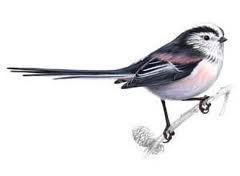
The pickings were rather slim. I was delighted that a robin, a blackbird, a greenfinch and a pair of blue tits made appearances during my allotted hour. I had six feral pigeons, predictably, and some starlings, too. And one plump wood pigeon, the pigeon it’s OK to like. A finch came down, too fast for me to see, and took a sunflower seed from one of the bird feeders, but I could only see its tail through my binoculars, and wasn’t able to confidently identify it. It looked like a chaffinch, which is the least common of the finch family in the garden, but I didn’t want to wrongfoot the survey, so I had to let it go. The real star of the show was a long-tailed tit [above], a curiously exotic little bird which looks a bit like a lollipop, and usually descends in a group of four or five. Just one this time, but a real catch. It brightened up my otherwise fairly standard tally.
What was particularly lovely was hearing the birds before they alighted. I could hear sparrows, but not see them. (They seem to prefer the bushes in the front yards of the houses in the street, and the eaves, which they noisily colonise.) I certainly heard the long-tailed tit before clapping eyes on it. And the robin sat on a high branch of a neighbouring tree and sang its heart out for quite a considerable amount of time. Just watching a bird singing through the binoculars is a gift – seeing its beak open as it produces its high-pitched symphony.
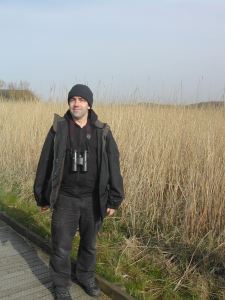
I don’t get out into the field as much as I’d like. This is a picture of me birding in Norfolk in 2008 (Cley Marshes, I believe), taken by my most excellent ornithological pal and bird guru Dave. He really knows his stuff. I do not think of myself as a birdwatcher, or twitcher, as that would be self-aggrandising. I am happy with bird lover, or bird enthusiast. If you saw my Secret Dancing one-man show in 2010, you’ll know the section about my Three Birding Ambitions. Those still stand.
Having rediscovered my own 2007 post about the pied wagtail – which is here if you didn’t click to it from Twitter the other day – and how universal its sentiments were then and are now, it’s good to reconnect with the natural world via the magical accessibility of British garden birds. I once accidentally lived in Surrey, and had a bigger garden, and the pickings were abundant, but you can see a pied wagtail on the asphalt of a car park, you don’t need to live in the woods.

January 24, 2013
Writer’s blog: Week 4, Thursday
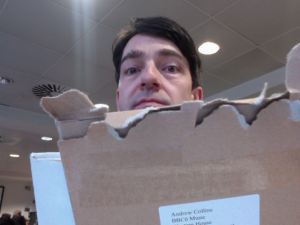
This picture is a cheat, as I took it yesterday, Wednesday. But it is packed with significance, of a sort. On Monday, as documented, I travelled to Dorset and back on the train, about 12 hours round trip, door to door. That was pretty unusual for a working day, and a pleasant diversion. I haven’t travelled outside of London since then. Most days – and this is why I don’t inflict a daily diary on anybody – I’m in the British Library, or at the Radio Times office, or shuttling between meetings and work engagements in and around Central London, at the peak of activity either writing, or talking.
How interesting is any of this? How interesting in anybody’s daily life? As it happens, later today I am catching another train, this time to Northampton, as I’m giving a lecture/Q&A to journalism students at the University of Northampton tomorrow. It being a careers-based talk, I shall be roadtesting Andrew Collins: 25 Years in Showbiz, or Indecision: a Career Choice. There will be slides. I don’t write these talks, as such, but I shape them in advance, and use props, or images, to punctuate them and act as guides for me. I don’t like them to be too rigid; I prefer to roll with the reaction of the audience – if, that is, I can gauge it. Students can sometimes be inscrutable, but most are at an age when “cool” drives their personalities. I know this. I was one.
Here’s how my life works: I do a string of low-paid jobs and then, occasionally, if the stars align (fingers always crossed), I get a higher-paying job for which I actually have to block out weeks or months in order to fulfill the commitment. It’s not unusual for a self-employed person to exist in a permanent state of rollercoasting. A talk at a university is not a high-paying job, but I like doing them, they keep me in practice for public speaking, and it’s Northampton, so I can visit my parents and claim back the modest train fare. I am looking forward to both bits.
The snow’s almost melted in London. I’m glad to see the back of it. It breaks my heart to see how weak this country’s infrastructure is. God help us if there’s a war.
Yesterday, I did two low-paid jobs, and I managed to group them together so that I could do one, followed directly by the other – one was in Broadcasting House, the other in Western House, both BBC buildings, and next door neighbours. For both jobs, I was being interviewed for the radio, but pre-recorded, which means you say a hell of a lot more than anybody listening to the radio will ever hear. For the first, I was interviewed about the film Jaws. When the programme airs on Radio 4, I’ll let you know. This was fun. I had my childhood diaries from 1976 and 1977, so could revisit how, as an 11-12-year-old, I was affected by Jaws, long before I actually saw it. (I saw it in March 1977, when I was old enough to see an “A” certificate.)

Next stop: 6 Music, where I was interviewed by Steve Lamacq’s producer Phil about Britpop – specifically the April 1993 “Yanks Go Home” issue of Select, on which I worked – for an ongoing history project about which I’m sure all will be revealed. I am an interviewer’s dream and worst nightmare: ask me a question and off I go. Especially if it involves remembering. I am good at remembering out loud. (Coincidentally, this hallowed issue of Select is one of my props for tomorrow’s talk at the University.)
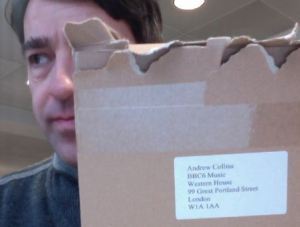
Anyway, the gaps between my visits to 6 Music are lengthening. The last time I was in, before Christmas, was to appear on Steve’s show when he was doing the TV Themes World Cup. Before that? October, when I literally just dropped by to empty my pigeonhole, which kindly pluggers and PRs still keep topped up with pre-release CDs by bands I’ve usually never heard of. It’s nice to be remembered by them. And I left 6 Music with about 20 singles, all of which I intend to listen to, out of gratitude for being given them, and out of eagerness to hear something new that I like. I get a Tweet at least once a week asking when Josie Long and I are back on 6 Music. Never, I fear. We had a great run in the six months leading up to Christmas 2011, but have never been asked back, which, after a calendar year, is a fairly easy to read sign.
I sincerely hope 6 Music will get me back in 2013 to emergency plumb for one of their regulars. It’s the best place on earth to broadcast from. But here’s the scary bit: although people I know at 6 Music are always cheery and pleasant to me when I venture back into the office, each time I go in, more faces have appeared whom I don’t know. This is bound to happen. Eventually, all my contacts there will erode, and my name will fall off the whiteboard. It happens. You’d be amazed how many people who don’t listen regularly to the station still think I have a regular slot on the network. (The guys from BBC Bristol who interviewed me about Jaws did.) You have to move on.
Remember the theme of my talk? Indecision. It’s indecision that’s driven and stunted my career at the same time. Not being able to decide which path to take – or to commit to one branch of the entertainment industry – has lead to an enormous range of work over those 25 years, but it has also prevented me from specialising in anything. I accept that as my destiny.
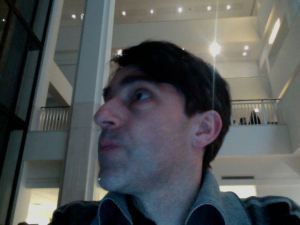
And here I am, in the British Library canteen again, contemplating that very conundrum. Any questions? (That’s what I’ll be asking at the University of Northampton tomorrow.)

January 22, 2013
New look
 This week on Telly Addict, I mainly reviewing the new ITV logo. Oh, and some actual telly programmes, including the first, heinous two-part Lewis on the “new look” ITV; the phenomenal conspiracy thriller Utopia on C4; the PG Wodehouse adaptation Blandings on BBC1; and a quick look at a couple of belated highlights from The Golden Globe Awards, shown here on FiveUSA.
This week on Telly Addict, I mainly reviewing the new ITV logo. Oh, and some actual telly programmes, including the first, heinous two-part Lewis on the “new look” ITV; the phenomenal conspiracy thriller Utopia on C4; the PG Wodehouse adaptation Blandings on BBC1; and a quick look at a couple of belated highlights from The Golden Globe Awards, shown here on FiveUSA.

January 21, 2013
Writer’s blog: Week 4, Monday
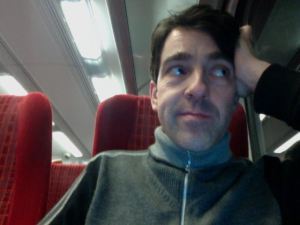
I feel like doing one of these, now that the year has sort of kicked in a bit. It’s Monday, and I’m on a South West Trains train from Bournemouth to London (you can tell it’s a South West Trains train because there are no seat numbers, so you can’t book, and they have not heard of power sockets on trains). I have not been to Bournemouth. But because of what I think of as “weather”, but the infrastructure of Great Britain thinks of as “an emergency”, the usual train from London to Dorchester South is now divided up into two bits, so you must change at Bournemouth.
Proustian rush: in 2004, I came to Bournemouth, on my own, to attend the Tony Hancock Appreciation Society annual dinner at the hotel where Hancock lived, briefly, as a child, Darlston Court. I was a member of the THAS for a couple of years, and enjoyed it very much, although I confess I felt a little out of place at the dinner, where, as a 39 year-old I felt decidedly young. The late Ray Alan and the still-going June Whitfield were guests of honour. A unique evening. Here’s a pic:
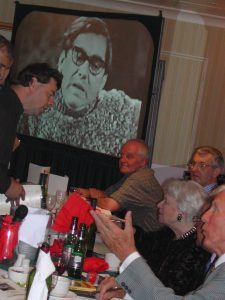
Anyway, I was in Bournemouth this morning for about three minutes, the time it took to run down the platform from one train to another. My destination was Billy Bragg’s house, in Dorset, where I was called upon to interview him, off-camera, for the EPK (“electronic press kit” – get with the 90s record-industry jargon) that will herald his surprising new album, Tooth and Nail, in March. You can read about it and hear some music on his rebooted website. (You can also engage him in a free and frank dialogue about why you may only pre-order the album via his website from Amazon or iTunes. Although I’ll tell you in advance that there had originally been a link to HMV but HMV went down before the page went live. It’s funny how the massive chain of superstores now almost feels like an indie alternative, post mortem.)
As previously mentioned, I was down at Billy’s before Christmas to research the new chapter for my official biography, which I have now delivered, and for which we don’t have a specific publication date, but it will be available for the first time as an eBook. It was a brief visit, top-heavy with travel, light on actual engagement, but we had enough time to effect the genial interview for the cameras, and to eat a wrap and some soup, before I was shuttled back to the station for the two-train ride home. (It was good to meet Jack, who is making the films.)
I’ll be honest, the whole thing was an utter pleasure. Not the most taxing job in the world, I grant you, but I’ll be back down the mine tomorrow. It was a welcome chance to get out of London and to soak up the views of rural and coastal England which the train affords, much of it carpeted in snow. As I rather unkindly Tweeted, when we passed through the marshlands around the Wareham Channel, where wading birds dotted the uninterrupted view out to sea, the blissful sight was only tarnished by the seasonal phlegmy coughing of my fellow passengers in the “quiet coach”. (I dare not turn around to look, in the carriage I am in presently, as it sounds suspiciously as if someone is clipping their nails. Let’s at least hope it’s the fingernails.)
On a locomotive theme, I am thoroughly enjoying BBC2′s Great British Railway Journeys, with Michael Portillo, the gentle travelogue brand that he has made his own over the past few years. Forget his politics. He’s a true rail enthusiast, and I always think of his bright pastel shirts and his Bradshaw’s Guide when I step on or off trains now. On a recent leg, he was travelling through Kew, and happened upon a plaque commemmorating the re-opening of Kew Bridge station in 1989 by then-Transport Minister in the Thatcher government, Michael Portillo. (I guess it’s ironic that a man whose party privatised – and thus tore the heart out of – the railway network in this country now promotes them.)

Even though South West trains don’t have anywhere you can plug anything in, and the wi-fi/mobile signal was the very definitive of patchy the other side of Basingstoke, I managed to do some work on the way down, and on the way back. I am currently developing two comedy pitches (well, one of them is a comedy drama) for a certain broadcaster, based upon a reasonably upbeat meeting last week. This is where you work for free, on spec. It was ever thus, but I like the pressure to have to come up with brand new ideas; it’s amazing how fruitful that artificial process can be in getting the gears to go round.
You’ll be relieved to learn that I have now successfully seen all of the key “awards season” movies, just in time for last week’s Golden Globes, and in plenty of time for the Baftas and the Oscars. Django Unchained is now in cinemas, so you can go and see that, and Lincoln is almost upon us. I’m seeing The Sessions tomorrow, as that’s out, too. It’s always a golden time of year for the higher end of American cinema. But don’t expect it to last. Come March, I’ll be gagging for something in a foreign tongue. (On the subject of which, I’m delighted that Haneke’s Amour is being treated as “a movie” this year, and not as a “foreign movie”. It’s picking up nominations and awards left, right and centre. Good.)
I may not blog every day this week, but I will if anything out of the ordinary happens.

January 16, 2013
Bondage: up yours!


I hope it is not being too melodramatic to state that slavery is a cancer on the history of the United States of America. (Just as it is on any nation that shipped in Africans, or other foreigners, to do their dirty work, pressing them into forced servitude.) That the descendents of those slaves had to wait until the year I was born before they achieved full voting rights is a further stain on a nation that loves to call itself “great.” I speak, of course, as an Englishman by birth – a native of a country that has plenty to be ashamed of in its history, and as a nation in the present day; I also speak as one of the gender which caused most of the trouble, so I speak of this issue objectively and without any sense of moral superiority.
As you may know, Roots, the 1977 TV miniseries that famously addressed the issue of slavery head-on, and it is said, changed attitudes across America, was my favourite programme as a schoolboy. I was so moved by and invested in the freeing of the black African slaves, thanks to Alex Haley’s book (which I chose to receive at a middle school prizegiving), that I wrote many diary entries of the time in phonetic Southern African-American; hence, the notoriously inept compliment from a besotted 12-year-old white English abolitionist, “Roots is mah favourite programme.” (This is all in my own memoir, whose roots have never been contested in court, as Alex Haley’s were.)
The issue of slavery was central to Steven Spielberg’s Amistad (1997), although much of that film’s central story revolved around a Supreme Court ruling. It was however, unflinching in its portrayal of cruelty to African slaves. Its take-home message was: the only good white American is an abolitionist. Spielberg’s Lincoln, already Golden Globe-garlanded and likely to win Baftas and Oscars, is, by coincidence just one of two major motion pictures to address slavery this awards season. The other – quite, quite different in tone and effect – is Quentin Tarantino’s Django Unchained (honoured at the Globes for its screenplay, and for supporting actor Christoph Waltz). I saw both films last week – on the same day, believe it or not. And am moved to compare them.


Lincoln was initially conceived, with screenwriter Tony Kushner (Angels in America, Munich), as a Presidential biopic, but in the event focuses on the knotty, nail-biting, filibustering progress through the House of Representatives of the Thirteenth Amendment, which outlawed slavery for good. Taking place over a couple of months, it distils Lincoln’s presidency down to his most far-reaching achievement, which also marked the end of the Civil War, despite seemingly putting peace in jeopardy to many naysayers. The 16th President is brought back to life, with understated authority, by Daniel Day-Lewis, who resembles him physically (especially in great height), and sidesteps his usual showboating, which is apt, as, amid the eloquent barracking of 19th century politics, the President is mostly absent. We see him in back rooms, on the sidelines, manipulating and commentating.
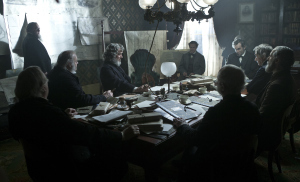
Venerated by many as one of America’s greatest commanders in chief, he is cleverly lit and depicted in Lincoln as a kind of sepia deity. To many on the left, he was a hero, or a god, certainly a celeb. As he says, in one of his more animated moments, as the President he was “clothed in immense power”, and used it. And then he was shot dead. Revisionism has, naturally, taken place in the centuries since, and some historians enjoy calling him a “white supremacist” whose views on blacks were not entirely progressive. Such rewrites are not important to Spielberg’s black-and-white film. (Actually, even the most hardline Confederate in the Southern states today is probably beyond thinking slavery was a good thing. In that sense, it is a black-and-white issue.) At the time of the Civil War, many in the South felt that their economy would collapse if slavery was banned; perhaps it was less about race and human rights, and more about that age-old American concern of money.

Few black people appear in Lincoln. There are a couple of kindly servants at the White House (Gloria Reuben – Jeannie off of ER! – and Stephen Henderson), freed slaves of course but still essentially bowing and scraping to a white employer. But Lincoln is not about the plight of slaves, it is of their plight; although it does open on a rare action sequence (it’s mostly talking), in which black Union soldiers are attacked by white Confederates. A powerful case is then made, to Lincoln’s kindly face, by a Union soldier (our own David Oyelowo, off of Spooks) about the inequality of wages, and of the chances for promotion, in the US Army, at which even the Emancipation President is challenged about the woeful limits of his vision for equality, even after the Proclamation. Django Unchained, meanwhile, is full of black people. It takes place two years before the Civil War, and is, of course, a wholesale fantasy. It is probably unkind to compare it to Lincoln, but many will find it more palatable and entertaining, so it’s just as important.

Django is an African slave, chained and en route through Texas, who is effectively stolen by a foppish German bounty hunter Schultz (Christoph Waltz) at the beginning of the film; he is a prize because of information he has about certain slave owners with a bounty on their heads. The two hit it off, and after offering freedom to Django in exchange for his assistance, Schultz eventually takes him on as an “associate”, an equal. (When Django rides into town, the very idea of a “nigger” on horseback is enough to rile the locals.)
This against-the-grain, black-and-white merger is symbolic of Tarantino’s liberal wish-fulfillment: a white European and a black African taking revenge on evil white plantation owners, riding side by side as compatriots. When Django takes up the whip against one of his former masters, the poetic revenge is literal. The pair are initially driven by money (Django is promised a horse and $75 as well as his freedom), but their combined cause takes on a less mercenary, more ideological and political hue, as they home in on Leonardo Di Caprio’s arch-villain Calvin Candie, not just a sadistic slave-owner, but one who wheels and deals in the gentleman’s sport of “Mandingo fighting”, where black slaves are set upon each other like dogs, or cocks. He is a bad man. Schultz, who elevates Django to the status of the noble hero Siegfried in German mythology, is a good man, but rare among whites in being so.
Django Unchained might once, in the 70s, have been made by a black director, of whom there were very few, but it would have been for the midnight-movie circuit only. Today, thanks to the mainstream profile of Tarantino – Hollywood’s pet cult director, its “house rebel” – it is a major movie, taken seriously by critics and peers alike, and already stamped with award glory (including a Globe for Tarantino’s screenplay). As such, it sends out a powerful message. Equally, it preaches to the choir. If a single member of Hollywood’s royalty did not stand for Bill Clinton at the Golden Globes, he or she was not caught on camera.
Spike Lee has said he refuses to watch it, as for him, the issue is not suitable for entertainment, which this film surely is. It’s up to him, of course, but you might accuse Roots of being simplistic, or melodramatic, or even sentimental, about a serious issue, but it stirred the soul of at least one 12-year-old in England in 1977, and thousands more elsewhere, I suspect. Django Unchained strives for no such educational nobility or legitimacy; it is violent cartoon schlock, whose mischievous humour at one point strays into pure Mel Brooks territory, and in fact, by fantasising a black rebellion against the white oppressor in spaghetti western style, you could argue that it makes a mockery of the true violence done before emancipation.
You could also argue that sending a group of Jewish Americans out into a fantasy Nazi-occupied Europe to kill them (and carve swastikas into their foreheads), as Tarantino did in Inglorious Basterds, mocks the memory of the millions who died in World War II. But it’s hard not to think of Nazis or cruel white slave-owners as “the baddies”, so who’s to dictate whether it’s in good or bad taste?
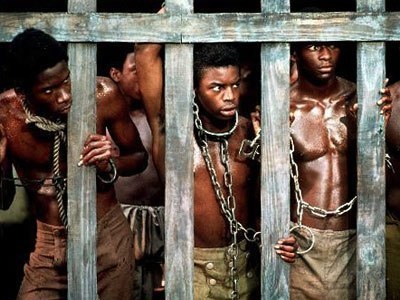
On points, I’d say that Lincoln is by far a better film than Django. It may be “boring” to some, but I lapped up its constitutional detail. It may iron out some of the inconsistencies that get in the way of Abe’s deification (ooh, his wife, Mary, came from a slave-holding family – that’s because there was slavery), but I still found it compelling. Tarantino’s film is uneven. It starts well, but descends into a relentless bloodbath; and even though it’s over two-and-a-half hours long, Django’s “journey” seems to jump-cut from character development to comic-book hero-avenger without a great deal of grey area in between. (Oh, and Waltz dominates for two thirds, and then sort of fades into the sidelines. Bad decision.)
That Tarantino wishes he’d been born black seems no longer in doubt. He’s been in trouble before for metronomic use of the n-word, although his previous films – including Jackie Brown, which drew a lot of heat – have been set post-reclamation of the word. Django is set at a time when “nigger” was a word filled exclusively with hate and oppression, and when Samuel L Jackson’s cowed, Uncle Tom-style butler uses it, we’re in very uncomfortable territory. This n-word is not spelled N-I-G-G-A. Perhaps it’s Quentin’s first truly responsible use of the epithet.
I realise I’ve just written an essay. Sorry about that. If I had been writing it for a magazine that was paying me to write it, I would have gone back and edited it.

January 15, 2013
I love 1973
 I apologise for the late running of the plug for this week’s Telly Addict. I’ve been busy. At any rate, it’s been up all day, and within it, you will see my nice new haircut, a shirt I haven’t worn very often and some considered, erudite, witty reviews of – plus some controversially throwaway remarks about – the adorable 1973 John Betjeman documentary Metro-land, shown again last week on BBC4; the similarly locomotive Great British Railway Journeys with Michael Portillo on BBC2; the perhaps unfairly maligned Mr Selfridge on ITV1; the quite horrible World Without End on C4; and the return of Silent Witness to BBC1 for its 16th series! I’ve already found myself in a titanic struggle with a persistent man over at the Guardian website, should you have more time on your hands than sense. You’re more than welcome to discuss these shows here, in a friendlier environment. I always reply.
I apologise for the late running of the plug for this week’s Telly Addict. I’ve been busy. At any rate, it’s been up all day, and within it, you will see my nice new haircut, a shirt I haven’t worn very often and some considered, erudite, witty reviews of – plus some controversially throwaway remarks about – the adorable 1973 John Betjeman documentary Metro-land, shown again last week on BBC4; the similarly locomotive Great British Railway Journeys with Michael Portillo on BBC2; the perhaps unfairly maligned Mr Selfridge on ITV1; the quite horrible World Without End on C4; and the return of Silent Witness to BBC1 for its 16th series! I’ve already found myself in a titanic struggle with a persistent man over at the Guardian website, should you have more time on your hands than sense. You’re more than welcome to discuss these shows here, in a friendlier environment. I always reply.


January 12, 2013
I love 2006
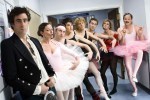
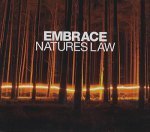

I don’t love 2006, or at least, no more than I love any other year from the past, but it was brought to my attention yesterday that the “feed” for this blog (I don’t really know what a feed is, but I know there is one) has – of late – been clogged with seemingly random old posts from 2006. I know why, but I don’t know why, so if someone can help me with this, I’d be grateful:
For some reason, when I switched servers a couple of years ago, a whole load of pictures I’d posted to accompany some of my older blog posts disappeared. So, occasionally, I’ll randomly dip into the archive and reinstate the pictures. While doing this, I also neaten up the comments sections. Another bizarre thing: when migrating this blog to WordPress from Blogger even more years ago, only about three quarters of the comments were transferred across. So I migrated the whole thing again, and, in many cases, each comment now appears twice. This is annoying. I know for a fact that very few people read those old blog entries, but I am nothing if not a perfectionist, so – occasionally – I delve back in to remove the duplicate comments, too. (Three of the random pics I’ve recently reinstated are lined up above. Yes, pretty random.)
Anyway, when you do this, you have to press UPDATE (where you would normally press PUBLISH on a new post). Seemingly, this announces the old posts on my “feed” as if they are new.
This must be annoying for those who follow me via “feed.” Anybody clever know how I can update old posts without fanfaring the fact?
It doesn’t matter if not. None of this really matters that much. I’ve not even had my breakfast yet.
Oh, and if you want to explain what a “feed” is for, I’d like that, too.

Andrew Collins's Blog
- Andrew Collins's profile
- 8 followers



